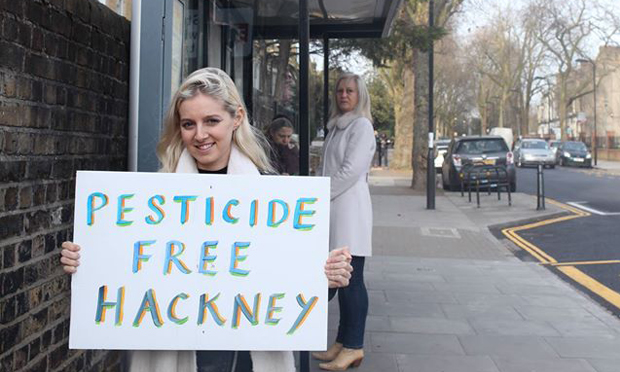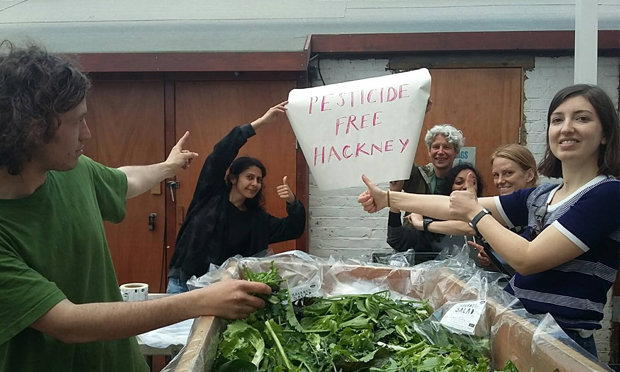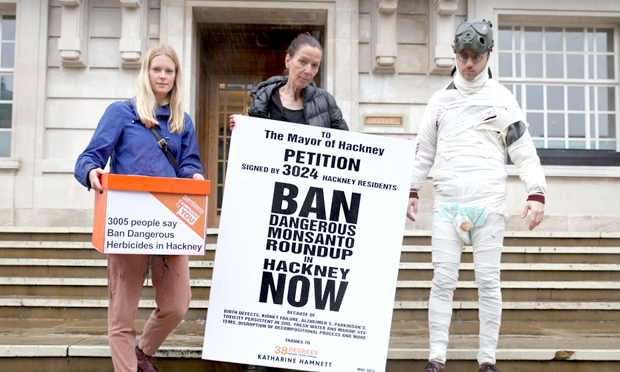Pesticide Free Hackney campaigners urge council to stop using ‘toxic chemicals’

‘Toxic nasties’: campaigners want to keep pesticides out of Hackney. Photograph: Pesticide Free Hackney via Facebook
Support for a campaign demanding a stop to the use of pesticides in the borough – including the controversial chemical glyphosate – has snowballed, with a petition attracting almost one thousand signatures, and the backing of fashion designer Katharine Hamnett CBE.
The Pesticide Free Hackney group is calling on the Hackney Council to follow in the paths of cities such as Paris, Toronto and recently Brighton, which have voted to stop toxic chemicals being used in public spaces.
Sarah Bentley, who started the online petition, wrote: “There is growing evidence chemicals (such as glyphosate) used for pest and weed control in Hackney are damaging to human health, in particular children.
“Our kids need to be able to play safely in Hackney parks – face down in the ground – without fear of exposure to glyphosate and other toxic nasties.”
The petition’s backers so far include food charity Made In Hackney, the Growing Communities sustainable food group and the Arcola Theatre, which is striving to become the world’s first carbon-neutral theatre.

Growing Communities is backing the petition. Photograph: Growing Communities via Facebook
‘Toxic’
The campaign echoes similar previous movements that sought in vain to convince Hackney Council to stop using glyphosate, which the World Health Organisation last year found to be “probably carcinogenic to humans”.
One such campaign was led in 2013 by Katharine Hamnett CBE, who has added her backing to the recent call for an all-out ban on “toxic chemicals”.
She told the Hackney Citizen: “We need to get rid of this stuff. It’s not needed. It’s completely toxic.”
“We have some of the worst air quality in Europe. Having chemicals like this just compounds the situation.”

Katharine Hamnett (centre) and supporters of a ban on glyphosate petition the Town Hall in 2013. One protester (right) wears incontinence pads, highlighting the link between glyphosate and kidney damage. Photograph: 38 Degrees
Ms Hamnett called the debate a “human rights issue”.
“People are being inadvertently exposed to harmful chemicals that are linked to diseases and birth defects, without them even realising,” she said.
“What triggered it for me is a few years ago I saw young people picnicking, eating with their hands, in London Fields. They were just yards away from the wildflower meadow, which it turns out was sprayed with glyphosate. I had no idea that this thing was everywhere.”
However, Hackney Council defended the use of the chemical glyphosate.
Dr Penny Bevan, Director of Public Health at Hackney Council, said: “Councils across London and the rest of the country use glyphosate for weed control and it’s widely available to the public in garden centres and DIY stores, commonly branded as Roundup.”
“Hackney Council follows government guidance on weed control and glyphosate has been declared safe for the targeted spraying of weeds by Defra, Public Health England, the Health and Safety Executive and the EU. Its use has also been recommended by a range of wildlife and environmental charities.
“We will continue to follow government guidance on weed control but are open to alternative removal methods if they can be shown to be effective and affordable.”
Dr Bevan went on to deny the widespread use of pesticides in Hackney.
“We do not treat plants or trees with pesticides. The only pesticide we use in parks is to controls worm casts on cricket pitches without damaging other worm species.”
“Our pest control department only use rodenticides for mice and rats and insecticides for cockroaches, fleas, bedbugs and other insects to treat infestations in buildings. The products are approved by the Health and Safety Executive and are only ever used by qualified pest controllers.”
